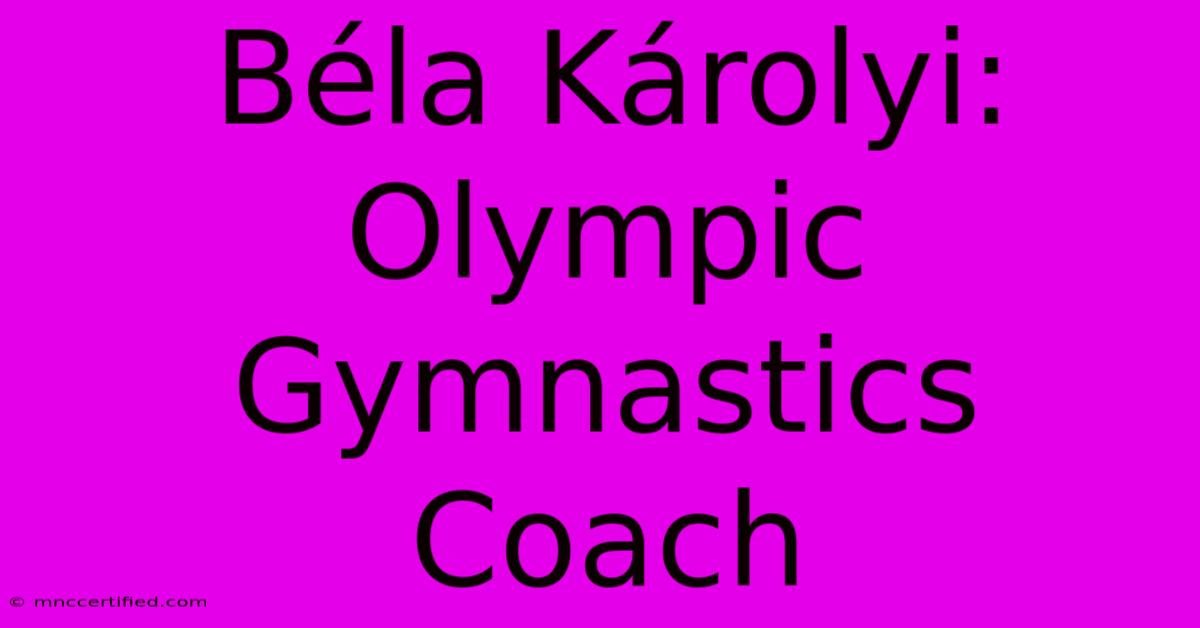Béla Károlyi: Olympic Gymnastics Coach

Table of Contents
Béla Károlyi: The Controversial Kingmaker of Olympic Gymnastics
Béla Károlyi, a name synonymous with Olympic gymnastics success, is a figure both revered and reviled. His coaching methods, while undeniably effective in producing numerous Olympic champions, have also been the subject of intense scrutiny and controversy. This article delves into the life and career of this complex and influential figure, exploring his triumphs, his controversial techniques, and his lasting impact on the sport.
The Rise of a Gymnastics Powerhouse
Born in Romania, Béla Károlyi's journey to becoming a gymnastics legend began with his own competitive career, albeit a short one. His true calling, however, lay in coaching. Along with his wife, Márta Károlyi, he established a formidable coaching partnership, developing a rigorous and demanding training regime that pushed gymnasts to their physical and mental limits. Their innovative techniques, focusing on power, precision, and artistry, quickly set them apart.
From Romania to the United States: A New Chapter
After achieving significant success in Romania, including coaching Nadia Comăneci, the first gymnast to score a perfect 10 at the Olympic Games, the Károlyis defected to the United States in 1981. This move marked a pivotal moment, not just in their personal lives but also in the trajectory of American gymnastics. Their arrival injected a new level of intensity and sophistication into the American training landscape.
A Legacy Forged in Gold: Notable Athletes Coached by Béla Károlyi
The Károlyi's impact on American gymnastics is undeniable. Their coaching produced a string of Olympic champions, solidifying their place in gymnastics history. Some of their most notable protégés include:
- Mary Lou Retton: The first American woman to win an all-around gold medal in the Olympic Games.
- Carly Patterson: The 2004 Olympic all-around champion.
- Kim Zmeskal: A three-time US national all-around champion.
- Shannon Miller: A seven-time Olympic medalist.
- Dominique Dawes: A three-time Olympian known for her powerful floor routines.
- Kerri Strug: Famously landed a vault on an injured ankle to secure a team gold medal at the 1996 Atlanta Olympics.
These athletes, under the Károlyi's demanding tutelage, achieved unprecedented levels of success, transforming American gymnastics onto the world stage.
The Controversies Surrounding Béla Károlyi's Coaching Methods
Despite his undeniable success, Béla Károlyi's coaching methods have been heavily criticized. Accusations of emotional abuse, verbal abuse, and creating a culture of fear have been leveled against him and his wife. The intense pressure and demanding training environment allegedly fostered an atmosphere where gymnasts felt compelled to prioritize training above their physical and mental well-being.
The intense focus on weight and body image also raised serious concerns. Many former gymnasts have spoken about the pressures to maintain an extremely low weight, contributing to eating disorders and other health problems. These allegations have fueled intense debate and prompted calls for reform within the sport.
The Aftermath and Ongoing Discussions
In recent years, the #MeToo movement and subsequent investigations into abuse in gymnastics have brought renewed attention to the accusations against Béla Károlyi. While he has never been criminally charged, the accounts of former gymnasts have sparked important conversations about the ethical considerations in elite sports coaching and the need for safeguarding athletes from abuse.
Béla Károlyi's Enduring Legacy: A Complex Narrative
Béla Károlyi's legacy is undeniably complex. He undeniably shaped the landscape of American gymnastics, producing numerous Olympic champions and elevating the sport to new heights. However, this success comes at a cost. The allegations of abuse and the questionable training practices cast a long shadow over his accomplishments, forcing a critical examination of the price paid for athletic excellence. His story serves as a cautionary tale, highlighting the need for ethical considerations and athlete well-being in high-performance sports. The debate surrounding his coaching methods continues, reminding us that success should never come at the expense of an athlete's health and well-being.

Thank you for visiting our website wich cover about Béla Károlyi: Olympic Gymnastics Coach. We hope the information provided has been useful to you. Feel free to contact us if you have any questions or need further assistance. See you next time and dont miss to bookmark.
Featured Posts
-
Lakers 5 Game Win Streak Pelicans Score
Nov 17, 2024
-
Ufc 309 Nickal Wins Booed
Nov 17, 2024
-
Nba Dfs Picks Saturday November 16th
Nov 17, 2024
-
Live Stream Clemson Vs Pittsburgh Football
Nov 17, 2024
-
Oritse Williams First Child Born
Nov 17, 2024